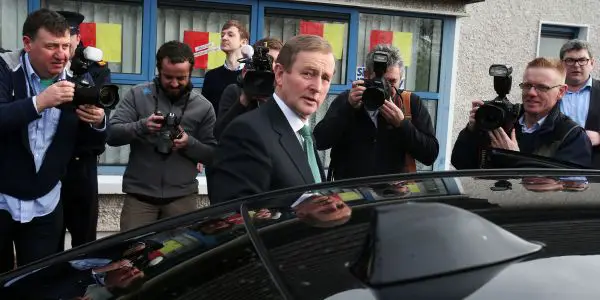Taoiseach Enda Kenny has ruled out resigning after his government suffered a resounding thumping in the General Election.
With the Republic’s political future in disarray and several coalition combinations on the table, the Fine Gael leader refused to be drawn on the prospect of a pact with traditional adversaries Fianna Fail.
“It is a position that one never likes to be in but I want to make it clear that I expect that the Fine Gael party will be a large bloc in the next Oireachtas,” he said.
“From that point of view, my responsibility as Taoiseach is to work to see that our country has a stable government and that has a government that can continue the progress that we have made over the last number of years in bringing the benefits of a recovering economy to all our people.”
Mr Kenny, who had a 30-seat majority after the 2011 election, admitted the election result was disappointing.
“Democracy is always exciting but it is merciless when it clicks in,” he said.
The Taoiseach faced questions over his leadership as Fine Gael are set to lose about 30 seats and the outgoing partnership with Labour is staring at a humiliating defeat.
Mr Kenny suggested a second election was not on the cards and he believed a new coalition could be formed despite one of the most fractious results in history.
“I’d like to think that it could be possible, given the final results, to be able to put a government together that could work through the many challenges we have,” he said.
Among the coalition’s biggest casualties were Alex White, Labour’s outgoing minister for communications, energy and natural resources, and Alan Shatter, the former Fine Gael justice minister, who were both defeated in Dublin Rathdown.
Catherine Martin took a seat in the constituency for the Greens, returning the party to the Dail for their first seat since the decimation of 2011.
Mr Kenny refused to consider any of the permutations for a new government either with Fianna Fail, a rainbow coalition or a minority arrangement.
The election looks like creating one of the most diverse Irish parliaments in history, with political leaders in line for weeks of protracted negotiations on potential coalitions.
Early indications suggest a widespread disaffection with mainstream parties and austerity mirroring a movement across Europe, including Spain, Portugal and Greece, where parliaments have been crippled by the voter schism.
The predicted outcome would be all the more remarkable as the political powerhouses, Fianna Fail and Fine Gael, struggle to secure support of 50% of the electorate for the first time in history.
With more than 10 seats out of 158 declared, Fianna Fail’s Micheal Martin, the opposition leader in the last Dail, insisted the focus was not entirely on bringing an end to 90-odd years of civil war politics by taking power with Fine Gael.
“We have made it clear we do not want to go into government with Fine Gael or with Sinn Fein,” he said.
“The idea that it is just down to two parties, I think, is ignoring the reality of how people voted.”
Sinn Fein will be the third largest party.
Under Gerry Adams, who topped the poll in Louth, the party looks set to continue its march south of the border with an expected increase in its vote and its presence in the Dail by around 50%.
Sinn Fein president Gerry Adams said he had “divided thoughts” on a potential Fine Gael-Fianna Fail coalition.
“They are natural partners, they are Siamese twins who have been divided for some time – they should get into bed together,” he said.
“That’s my positive attitude.
“My negative attitude to it is, this would be a most conservative regime if they do come together.”
Other outgoing Labour ministers Jan O’Sullivan and Kathleen Lynch are also at risk of losing their seats in the electoral bloodbath but Tanaiste, or deputy prime minister, and party leader Joan Burton scraped into the last seat in Dublin West.
In a remarkable comeback after its near wipeout at the last election, Fianna Fail could almost double its seats.
But the once-dominant party in Irish politics will remain a long way from its heyday majority, which tumbled with the economic crash it presided over nearly a decade ago.
The mounting disillusionment with mainstream parties opened an unprecedented opportunity for smaller parties and Independents to reap the rewards.
Mark Mortell, the Taoiseach’s closest adviser, said Ireland would have to review its “political system” once the outcome of its most uncertain election in recent times is decided.
“The only word I can use right now is deep disappointment,” he said.
